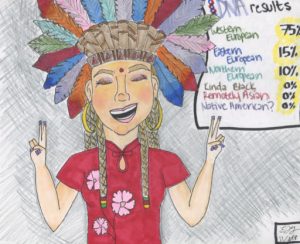By Emerald Green

Last month was Halloween, and people from one culture thought it was okay to dress up as someone from another. People who aren’t Native American donned headdresses and warpaint, and people who aren’t Mexican put on sombreros and mustaches (as if those things define these ethnicities). These cultures are not costumes, but therein lies the bigger issue of cultural appropriation in today’s society.
Even though the United States is a beautiful melting pot of different cultures, there is a difference between cultural appropriation and appreciation. Cambridge dictionary defines cultural appropriation as “the act of taking or using things from a culture that is not your own, especially without showing that you understand or respect this culture.” People who do respect other cultures do not appropriate, and appreciation only comes from an active participation in that culture.
If someone is invited to participate in another culture, then it is not cultural appropriation because that group wants to include that person in their culture at that time. Speaking another language, listening to music and eating foods of a different origin or wearing the attire of the culture you’re visiting are examples of cultural appreciation. Angelina Jolie wearing modest clothes when she visits the Middle East is a sign of respect; she does not wear these fabrics after she returns home because she understands that they mean more than that.
Appropriation is about an abuse of power. Historically, especially during times of colonialism, powerful colonizers stole art (among other things) from natives. These thieves sold and distributed those priceless artifacts to different parts of the globe without reimbursing the ethnicities the art was from. Those groups lost pieces of their history and identity that they can never get back. Many of these cultures are still fighting for what is rightfully theirs, but the people that should have no right to deny them do as exemplified in the story of Easter Islanders and the British Museum.
Native Americans have been pushed off their ancestral lands, placed on reservations, and pressured to assimilate into white America. Founder Richard Henry Pratt of the Carlisle Indian Industrial school (where Native American children were ripped from their families to erase their “savage” culture in the early nineteenth century) said “Kill the Indian in him, and save the man.” However, non-indigenous people are particularly attracted to wearing items of indigenous cultures including headpieces that traditionally mark earned authority and their versions of “warpaint.” Apparently, it’s not savage if someone who isn’t Native American does it.
Popular examples of cultural appropriation include the hairstyles and vernacular taken from black culture. Black women spend so much money altering the texture of their hair because society shames them for having it. When they are brave and proud enough to wear the styles (braids, cornrows and dreadlocks) of their ancestors or speak the way they do at home, they are judged and called words with negative connotations like “ratchet” and “ghetto.” Meanwhile Kim Kardashian-West, who is not black, is praised for regularly wearing braids and cornrows, but her black daughter, North, always has silky-straight pressed hair.
Black culture is specific because the only way that one can truly participate in black culture is to be black because the culture revolves around the way blacks are treated. The rest of the world discriminates against black people based on their skin color, vernacular and style, but for some reason society thinks it’s okay to take the trends that black people started and make them “dope” and socially acceptable (just not for black people). As actress Amandla Stenberg once said: “What would America be like if we loved black people as much as we love black culture?”
There is not one culture guilty of this crime, nor is there only one culture that is appropriated. One of Nicki Minaj’s most recent hits, “Chun Li” (2018), blatantly appropriates and even sexualizes Chinese culture. To be clear, Minaj is African-American and not Chinese, and despite claiming that she respects all cultures and has even gone so far as to criticize cultural appropriators, her “Chun Li” music video fetishizes Chinese and Asian cultures more than it appreciates them.
It comes down to this: inferior cultures are forced to adopt that of the dominant and abandon their own in public, but the dominant chooses to steal what remains of the non-dominant culture. For most people, taking part in their own culture is a powerfully meaningful act that connects them with who they are and where they come from. That is why it’s so disrespectful to associate someone’s identity with something as trivial as a Halloween costume.
Cultural appropriation is insensitive everyday of the year, but the line between appropriation and appreciation can be tricky. If you aren’t sure, ask members of that culture if they find it offensive, or stick to the culture(s) that you associate with. Showing that you care enough to ask is always appreciated.











